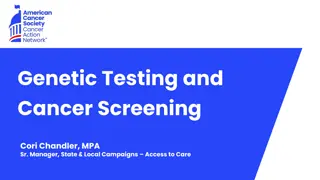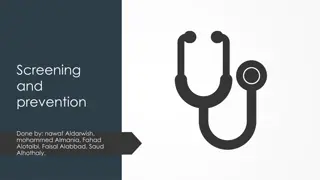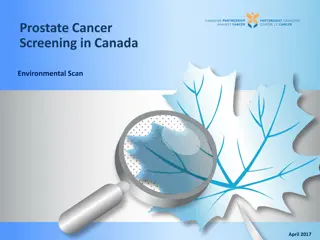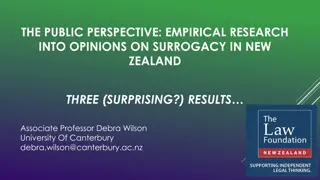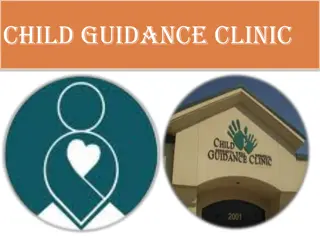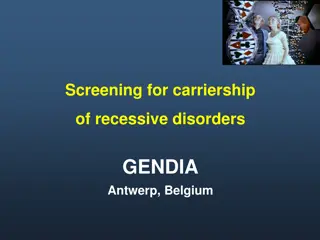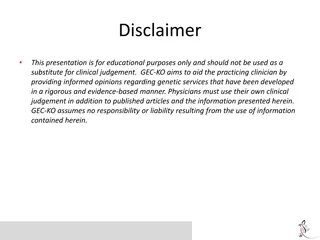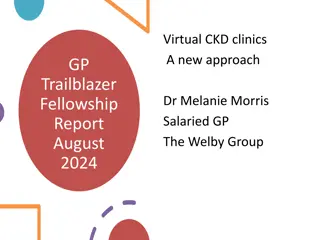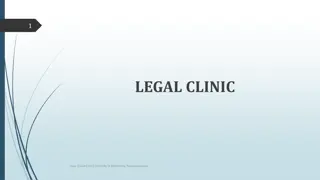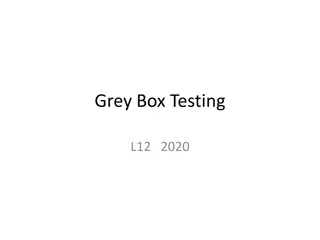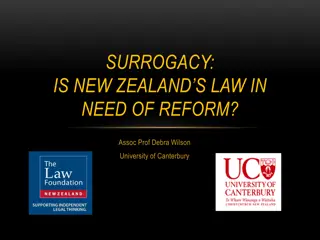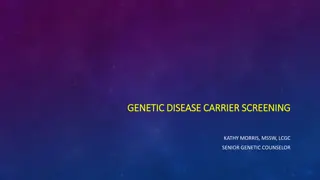Genetic Screening and Reproductive Carrier Testing in New Zealand Fertility Clinics
Genetic screening and reproductive carrier testing play crucial roles in identifying and managing genetic disorders in couples planning for pregnancy. While carrier screening is recommended for all couples, it is not widely followed in New Zealand. Pre-conceptual reproductive carrier screening is now offered in some private fertility clinics, but public access remains limited. The use of Preimplantation Genetic Diagnosis (PGD) is regulated under the HART Act 2004, focusing on familial single gene and chromosomal disorders. Resource constraints impact the provision of PGD in New Zealand.
Download Presentation

Please find below an Image/Link to download the presentation.
The content on the website is provided AS IS for your information and personal use only. It may not be sold, licensed, or shared on other websites without obtaining consent from the author. Download presentation by click this link. If you encounter any issues during the download, it is possible that the publisher has removed the file from their server.
E N D
Presentation Transcript
Genetic screening in NZ fertility clinics Dr Juliet Taylor Clinical geneticist Genetic Health Service New Zealand (Northern Hub)
Pre-conceptual reproductive carrier screening We are all estimated to be carriers for at least three clinically severe childhood recessive disorders HGSA/RANZCOG position statement All couples intending to have children, or who are pregnant, should be made aware of the availability of carrier screening for more common genetic disorders (CF, SMA, Fragile X) . This recommendation not widely followed. Carrier screening in public system (genetic services primarily) currently offered when there is a family history dependent on carrier frequency (prevalence of condition) or in certain ethnic groups (South East Asians (haemoglobinopathies), Ashkenazi Jews (range of disorders) Usually if carrier frequency is high but varies between genetic services Difficulties with carrier screening Possibilities of identifying variant of uncertain significance in unrelated partner complicates counseling Timing often accessed in early pregnancy, which increases anxiety and reduces options if both partners found to be carriers Cost
Pre-conceptual reproductive carrier screening Now offered in some private fertility clinics Couples cover cost Varying numbers of conditions can be tested for e.g. CF, Fragile X, SMA (Prepair https://www.vcgs.org.au/tests/prepair) versus hundreds of (Counsyl https://www.counsyl.com/ Pre and post test counseling essential to explain limitations of testing e.g. residual risk Equity of access User pays testing not readily accessible if seen in public system Only being offered to select group seen by fertility providers No plans for implementing population screening
Accepted uses of PGD HART act 2004 Familial single gene and chromosomal disorders Must have 25% risk and where there is evidence that the future individual may be seriously impaired as a result of the disorder Sex determination for familial sex-linked disorders 25% risk, serious and no specific test for that mutation is available eg. X-linked intellectual disability syndrome
Preimplantation genetic diagnosis (PGD) Pre-implantation genetic diagnosis in New Zealand Which genetic conditions are eligible for PGD ? Who determines whether a condition is eligible? The role of the clinical genetic service in the provision of this publically funded process. The effect of resource constraints in the provision of PGD in New Zealand.
Role of clinical genetics service All couples undergoing PGD in NZ must be seen by Clinical Geneticists Provide genetic counseling so couples understand their risk and their reproductive options Provide non-directive counselling about PGD Role in decision regarding serious disorder
Accepted uses of PGS Pre-implantation genetic screening (PGS) not publically funded diagnosis of non-familial chromosomal disorders (aneuploidy testing) where: (i) the woman is of advanced reproductive age (ii) the woman has had recurrent implantation failure or recurrent miscarriage
Pre-implantation genetic screening (PGS) Screening for large chromosomal imbalances (implantation failure, early miscarriage, viable trisomies e.g. T21) Who is being offered this technology? Recurrent pregnancy loss Recurrent implantation failure Advanced maternal age ?Everyone What is the evidence to support use of PGS? Not currently covered in public system but offered by private fertility providers
Preimplantation Genetic Screening (PGS) Conflicting evidence Improves implantation rate and live birth rate (Dahdouh, 2015. Fertil Steril 2015; 104:1503 1512. Meta-analysis 3 trials included Intention to treat analysis. Among all attempts at PGS or expectant management among recurrent pregnancy loss (RPL) patients, clinical outcomes including pregnancy rate, live birth (LB) rate and clinical miscarriage (CM) rate similar. (Murugappan 2016; Human Reproduction 31:1668 1674) PGS decreased chances of live birth in association with IVF. National improvements in live birth and miscarriage rates reported with PGS in older women are likely the consequence of favorable patient selection biases. (Kushnir 2016. Fertil Steril 106: 75 9) Concern of accuracy of diagnosis and high rate of false-positives. Gleicher 2016. Reprod Biol Endocrinol doi 10.1186/s12958-016-0193-6
Limitations Mosaicism some embryos considered unsuitable for transfer develop into healthy pregnancies (Greco 2015. NEJM 373:2089 90). ?Couples choice to transfer non-euploid embryo Pre and post test counseling essential Different platforms inconsistent results. Discordance in results seen in published reports (Tortoriello 2016. J Assist Reprod Genet 33:1467 1471)
Healthy Babies after Intrauterine Transfer of Mosaic Aneuploid Blastocysts NEJM 373:21
PGS in NZ Different providers offering testing done by different laboratories/companies - different technologies. ?Uptake ?Counseling provided ?Should PGS be offered outside of clinical trials before body of evidence substantial enough to support benefit
HFEA UK patient information What is my chance of having a baby with PGS? Because a large proportion of patients who receive PGS are older patients, patients with a history of miscarriages or other indications and also because many of the embryos produced are not suitable for transfer to the womb, the success rate varies considerably depending on the patient s individual circumstances. Various studies have questioned whether or not PGS is effective at increasing the chance of having a live birth. There is a lack of evidence that having a treatment cycle with PGS will increase your chances of having a baby compared to having a treatment cycle without PGS. More robust randomised controlled trials are needed before a decision can be made either way. Centres are required to validate the use of PGS (i.e. demonstrate there is evidence) for each category of patients they offer it to (e.g. advanced maternal age, recurrent implantation failure, recurrent pregnancy loss and male factor infertility)
Who should decide whether a disorder causes serious impairment? Clinicians - Clinical geneticists, Fertility specialists, specialists involved in managing condition Affected family Society Appointed committee
Human Fertilization and Embryology Authority (HFEA) - UK List of disorders that have been accepted as appropriate for PGD http://guide.hfea.gov.uk/pgd/ Conditions individually assessed for suitability Open to feedback from all sectors during submission process
UK legislation: preimplantation testing PGS: is permitted to establish if the embryo has a gene/chromosome/mitochondrion abnormality that may affect its capacity to result in a live birth. PGD: permitted when there is a particular risk that the embryo may have a gene/chromosome abnormality to determine if it has that abnormality or any other gene/chromosome/mitochondrion abnormality: any gene/chromosomal condition tested for must be associated with a significant risk of developing a serious physical or mental disability/illness. (HFEA list)
Genetic counseling in the future Known single gene disorders familial variation New genetic technologies will increase complexity Accuracy and reliability of DNA technologies Understanding what is normal at the level of the embryo Understanding the significance of mosaic disorders Predicting outcomes of embryo treatment






